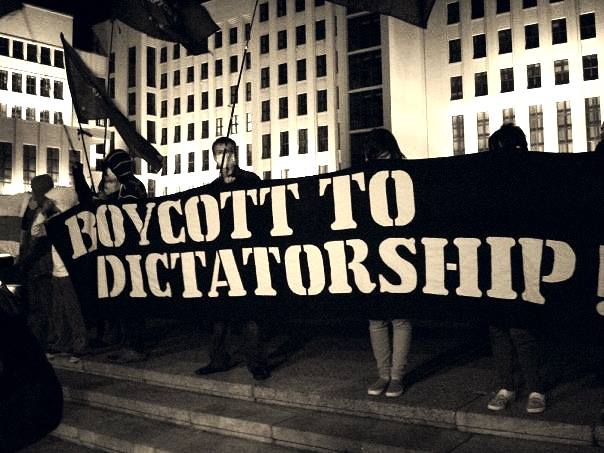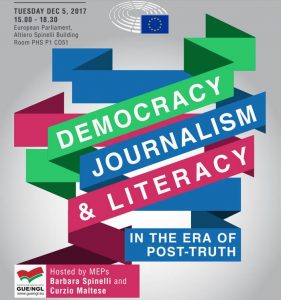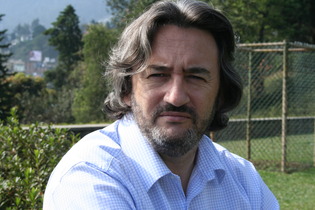19 Dec 2017 | Journalism Toolbox Arabic
[vc_row][vc_column][vc_custom_heading text=”في وقت يستفيق فيه الأمريكيون على ظاهرة “الأخبار المزيّفة“، يقول أندريه أليكساندراو بأن البيلاروسيين لديهم باع طويل في التعامل مع هذه التكتيكات التي خبروها لسنوات”][vc_row_inner][vc_column_inner][vc_column_text]

عناصر من الشرطة المسلّحة يحاصرون المتظاهرين في مينسك، عاصمة روسيا البيضاء (بيلاروس) عقب اعلان نتائج انتخابات عام ٢٠١٠ التي تم التشكيك في نزاهتها, Isabel Sommerfeld/Flickr
[/vc_column_text][/vc_column_inner][/vc_row_inner][/vc_column][/vc_row][vc_row][vc_column][vc_column_text]
ان فبركة وتزييف الأخبار في روسيا البيضاء (بيلاروسيا) ليس بظاهرة طارئة ظهرت فقط مؤخّرا. في نيسان / أبريل الماضي، قامت قنوات التلفزيون والصحف الحكومية بعرض صور مخيفة لمتظاهرين يحملون زجاجات المولوتوف الحارقة وغيرها من الأسلحة. وزعمت التقارير ان هؤلاء المتظاهرين هم أعضاء في “الفيلق الأبيض” وبأنهم يسعون لإشعال انتفاضة في مينسك على غرار الاحتجاجات المسّماة بـ “يورو ميدان” والتي انتشرت في أوكرانيا في عامي 2013 و 2014، مساهمة بشكل كبير في تفجير أزمة شبه جزيرة القرم فيما بعد.
ما يلفت النظر هنا هو أن المنتجين والمراسلين الذين أعدّوا هذه التقارير المصوّرة ظلّوا مجهولي الهوية. فلم تذكر أية عناوين أو أسماء فيها على الإطلاق. ولا يوجد هناك أي دليل على أن الفيلق الأبيض المزعوم، وان كان لديه سابقا وجود فعليا على أرض الواقع ، كان قد عاد الى العمل على أي مستوى في السنوات القليلة الماضية. ومن المثير للاهتمام أيضا أن الشرطة وقوات الأمن لم تجب على أي استفسارات من قبل الصحفيين أو من الجمهور حول هذه القضية.
اتضح فيما بعد أن القصة كان قد تم اختلاقها بأكملها، ثم تقديمها وبثّها على أنها قصة إخبارية حقيقية عن واقع مفترض، لنشر الخوف والذعر داخل المجتمع. وكانت الرسالة وراءها هي: لا تخرج الى الشارع ولا تشارك في التظاهرات، فأولئك الذين يفعلون ذلك يقوّضون السلام والاستقرار!
هذا تكتيك معتاد ولقد اتّبع في بيلاروسيا لسنوات عديدة مضت، حيث يتم إخفاء الأخبار الحقيقية لمصلحة الأخبار الزائفة المزدهرة في هذه البلاد. ويتم استخدام هذا التكتيك كثيرا في الوقت الراهن، حيث شهد عام 2017 احد أكبر الاحتجاجات في البلاد منذ سنوات عديدة، مما قوبل بردّ فعل عنيف من قبل الحكومة.
في ظل الحكم السوفيتي، كانت بيلاروس بلدا مزدهرا. ولكن عندما انهار الاتحاد السوفياتي، مرّت البلاد بفترة تدهور اقتصادي طويل. صعد الكسندر لوكاشينكو إلى السلطة في خضم هذا الاضطراب الاقتصادي والسياسي، ولا يزال اليوم في الحكم على الرغم من مرور 23 على توّليه الحكم. ويرجع ذلك إلى حد كبير إلى سيطرته على وسائل الإعلام، حيث استمرت الهجمات ضد الصحافة الحرة، والمدوّنين، والكتاب والصحفيين المستقلين جنبا إلى جنب مع أنشطة آلة الدعاية الرسمية الضخمة.
تتبّع برامج الأخبار على القنوات التلفزيونية المملوكة للدولة، التي تحتكر الأثير حيث لا توجد قنوات محلية خاصة، تتبّع نمطا بسيطا ولكن مقنعا، فتبثّ بدءا أخبارا عن الرئيس: ها هو يأتي ليحيّي سفير أجنبي ويلقي كلمة عن الدور الخاص الذي تقوم به بيلاروسيا في الاستقرار والسلام في العالم؛ أو ها هو يجتمع مع وزير الداخلية ليدلي ببيان حول أهمية الحفاظ على الاستقرار والسلام داخل المجتمع، أو يصرخ في مجلس الوزراء بأن عليهم أن يفعلوا كل ما يلزم لمتابعة أفكاره “الحكيمة” لخدمة مصالح الشعب (ناهيك عن السلام والاستقرار)،أو هو يقوم بزيارة مصنع في مدينة صغيرة ليتحدث إلى العمال وكأنّه والدهم الحنون ويقول لهم انه سوف يوفر لهم كل سبل الدعم والاهتمام.
بعد أن تبث القنوات الرسمية زهاء نصف ساعة من هذا النوع من الأخبار الرئاسية، تقوم بعدها بعرض مشاهد سريعة من بقية العالم: قذائف تسقط على أوكرانيا؛ قنابل تدمر مستشفى في سوريا، تصريحات غريبة من رئيس دولة تقع بعيدا عبر المحيطات. إرهابي يفجر نفسه في مدينة أخرى في أوروبا؛ لاجئون يتدفقون، وفيضانات، وركود اقتصادي، وحكومات تنهار. ثم يتبع هذه الأخبار المريعة تقرير حول أطفال سعيدين في رياض الأطفال البيلاروسية ثم بعض المشاهد الأخرى لبلد مسالم يقوده زعيم حكيم يبقى الملاذ الأخير لرفاه وخير البلاد التي تصوّر على أنّها واحة من الاستقرار في عالم عنيف جدا.
ولكن هناك أنواع أخرى من البرامج يتم بثها على تلفزيون الدولة عندما تشعر السلطات أن صورة “السلام والاستقرار” التي تبثها القنوات الحكومية تتناقض مع الواقع الآخر، أي ذلك الذي يراه الناس في الشوارع وفي أماكن عملهم، وفي محلات البقالة، وفي وسائل النقل العام، وفي المستشفيات والمدارس، وهو واقع يشذ عن العالم الوهمي التي تحيكه الدعاية الحكومية.
في بداية عام 2017، نزل الآلاف في جميع أنحاء بيلاروس إلى الشوارع للاحتجاج. شرارة تلك الاحتجاجات كان المرسوم الرئاسي الجديد رقم 3 الذي فرض غرامات على الأشخاص الذين لا يتمكنون من اثبات وجود أي عمل أو دخل لديهم. وقد أطلق عليه اسم “مرسوم الطفيلي الاجتماعي”. هناك مصطلح سوفيتي قديم،” تونيجادسي”، وهو يعني حرفيا الطفيليات، و “التطفل” كان يعتبر جريمة في العصر السوفياتي، حيث كان من المتوقع أن يعمل الجميع لبناء “المجتمع الشيوعي المثالي”. لكن “الاختراع” البيلاروسي ذهب خطوة أبعد في هذا المجال
[/vc_column_text][/vc_column][/vc_row][vc_row][vc_column width=”1/4″][/vc_column][vc_column width=”3/4″][/vc_column][/vc_row][vc_row][vc_column][vc_column_text]
مجترحا المعادلة التالية: عوضا عن دفع تعويضات للعاطلين عن العمل، قرّرت الحكومة بأن…تغرّمهم!
هذا المرسوم كان الشرارة. لكن السبب الحقيقي للاحتجاجات يكمن في الأزمة الاقتصادية العميقة التي لا زالت تجتاح البلاد، ممّا أظهر حقيقة ما يسمّى بـ”الاستقرار” البيلاروسي على أنه ليس أكثر من غيبوبة طويلة. فقد ورثت بيلاروسيا نموذجها الاقتصادي المرتكز على الصناعة من العصر السوفيتي، لكنه لم يجر إصلاحه قط. قد تعني هذه الإصلاحات، مثلا، التحول إلى القطاع الخاص، وتغيير القوانين لإعطاء ضمانات للاستثمارات الرأسمالية، وضمان استقلال السلطة القضائية، واجراء انتخابات برلمانية حقيقية، بدلا من أن يتم تعيين أعضاء البرلمان من قبل الرئيس كما يجري حاليا. كل هذه الخطوات، لو اتخذت، كانت ستقوض جوهر النظام الاستبدادي.
وهكذا، مضى اقتصاد البلد دون ادخال أي تغيير يذكر اليه. على مدى عقدين تقريبا، قامت روسيا بدعم دعم اقتصاد بيلاروسيا من خلال النفط والغاز والقروض الميّسرة، التي كان الكرملين قادرا على تحمّل كلفتها بفضل ارتفاع أسعار النفط وحاجة موسكو إلى حليف قريب منها. ولكن اليوم فقد بردت هذه العلاقة، ويرجع ذلك جزئيا إلى أن بيلاروسيا كانت قد عارضت ضم روسيا لشبه جزيرة القرم بعد أزمة أوكرانيا.
أصبحت الصعوبات الاقتصادية من جرّاء هذا الوضع محسوس بها في عرض البلاد، خاصة لدى سكّان المدن الصغيرة. ثم جاءت ضريبة “الطفيلي الاجتماعي”، فكانت بمثابة الشرارة التي أطلقت الاحتجاجات. نزل المتظاهرون بالآلاف إلى الشوارع للمرة الأولى منذ عام 2011، وفي بعض المدن الصغيرة، للمرة الأولى منذ عقد التسعينيات.
أتى رد فعل السلطات قاسيا. احتجزت الشرطة مئات الأشخاص على الرغم من سلمية احتجاجاتهم. وخلال أحداث مينسك في آذار / مارس 2017، استخدمت شرطة مكافحة الشغب القوة المفرطة لتفريق المتظاهرين، فاعتقلت حوالي ألف شخص. حتى أن العديد منهم كانوا من المارة العاديين ولم يكونوا جزءا من المظاهرات. وكان بعضهم أيضا صحفيين يحملون بطاقات تعريف صحفية صالحة.
من هؤلاء، ألقي القبض على أليكساندر بارازينكا، وهو مصور يعمل لقناة بيلسات الفضائية، خلال الاحتجاجات التي وقعت في 25 آذار/مارس 2017 في مينسك. يوجد فيديو له يصرخ “أنا صحفي!” بوجه بلطجيين يلبسون زيا رسمّيا، ثم يمسكونه ويجرونه إلى سيارة الشرطة. في وقت لاحق خلال محاكمته ادّعى ضبّاط شرطة مكافحة الشغب بأن بارازينكا كان قد تفوّه بعبارات بذيئة في مكان عام. ولم يولي القاضي أي اهتمام للتناقضات الصريحة في رواياتهم للأحداث وحكم على بارازينكا ب 15 يوما من الاعتقال الإداري، أمضاهم المصوّر مضربا عن الطعام في مكان احتجازه.
هناك العديد من الأمثلة المماثلة لقضية بارازينكا خلال ربيع 2017. ولكن هذه القصص لا تظهر أبدا على التلفزيون الحكومي.
لا تخلو بيلاروسيا تماما من وسائل الإعلام المستقلة. لا تزال هناك صحف غير حكومية ومنشورات إلكترونية تبيّن حقيقة ما يجري. كما ينشط المدوّنون والناشطون على شبكات التواصل الاجتماعية. في الواقع، عندما قامت وسائل الإعلام الحكومية ببثّ ذلك المشهد المزيّف للمحتجين المزعومين وهم يحملون الزجاجات الحارقة، ظهر على الانترنت فيديو آخر يبيّن أنه لم تكن هناك أي قوات للشرطة أو أي مجرمين مزعومين في مكان التصوير، ولكن فقط شاحنة ومجموعة صغيرة من مصوري تلفزيون الدولة.
قصّة الصحافي بارازينكا وغيره من المتظاهرين المحتجزين لا زالت تجد من يرويها، ولكن، للأسف، فإن صوت التلفزيون الحكومي المصحوب بالهذيان والعدائية لا يزال أعلى.
“لقد تم تبخيس قيمة كلمة وسائل الإعلام. إن السلطة لم تعد تكترث بما نعرفه عنها وآرائنا فيها”، كتب فيكتار مارتينوفيتش، الكاتب البيلاروسي المشهور، في بيلاروس جورنال. “لا يحتاجون إلى جمهور بعد الآن. هم لوحدهم. انهم يعتقدون انهم أقوياء بما فيه الكفاية وبأنهم خالدون. ونحن نفتقر إلى الكلمات لبرهنة خطأهم لهم”.
شخصيا، أعتقد بأننا سوف نجد هذه الكلمات عاجلا أم آجلا.
[/vc_column_text][/vc_column][/vc_row][vc_row][vc_column][vc_column_text]
أندريه أليكساندراو هو صحفي مقيم في مينسك، بيلاروسيا. وهو محرر “بيلاروس جورنال”
*ظهر هذا المقال أولا في مجلّة “اندكس أون سنسورشيب” بتاريخ ١٩ يونيو/حزيران ٢٠١٧
[/vc_column_text][/vc_column][/vc_row][vc_row content_placement=”top”][vc_column width=”1/3″][vc_custom_heading text=”100 years on” font_container=”tag:p|font_size:24|text_align:left” link=”url:https%3A%2F%2Fwww.indexoncensorship.org%2F2017%2F12%2Fwhat-price-protest%2F|||”][vc_column_text]Through a range of in-depth reporting, interviews and illustrations, the summer 2017 issue of Index on Censorship magazine explores how the consequences of the 1917 Russian Revolution still affect freedoms today, in Russia and around the world.
With: Andrei Arkhangelsky, BG Muhn, Nina Khrushcheva[/vc_column_text][/vc_column][vc_column width=”1/3″][vc_single_image image=”91220″ img_size=”medium” alignment=”center” onclick=”custom_link” link=”https://www.indexoncensorship.org/2017/12/what-price-protest/”][/vc_column][vc_column width=”1/3″ css=”.vc_custom_1481888488328{padding-bottom: 50px !important;}”][vc_custom_heading text=”Subscribe” font_container=”tag:p|font_size:24|text_align:left” link=”url:https%3A%2F%2Fwww.indexoncensorship.org%2Fsubscribe%2F|||”][vc_column_text]In print, online. In your mailbox, on your iPad.
Subscription options from £18 or just £1.49 in the App Store for a digital issue.
Every subscriber helps support Index on Censorship’s projects around the world.
 SUBSCRIBE NOW[/vc_column_text][/vc_column][/vc_row]
SUBSCRIBE NOW[/vc_column_text][/vc_column][/vc_row]
14 Dec 2017 | Mapping Media Freedom, Media Freedom, News and features
[vc_row][vc_column][vc_column_text]Veteran Belgian journalist and author of Terrorism and the Media, Jean-Paul Marthoz delivered the following remarks on 5 December 2017 at a round-table debate in the European Parliament hosted by MEPs Barbara Spinelli and Curzio Maltes:

Democracy, journalism and literacy in the era of post-truth
Everything has been said on fake news. Since the word ‘post-truth’ was chosen as the word of the year in 2016 by the Oxford dictionary there is not one day without an evocation of the ‘new kingdom of lies’.
Fake news however, as it is currently understood, is not any kind of lie. It is a deliberately mendacious or misleading information, specifically designed to have a disrupting impact (on society, geopolitics, etc.) and to become viral in the media and on social networks.
The word has taken on an eminently political connotation with Donald Trump’s 2016 campaign. The unexpected candidate of the Republican Party turned it into a brand, not only by filling his speeches and tweets with approximative or even false facts but also by accusing quality media of being the ones producing fake news.
The word has taken on a strategic dimension with accusations of Russia’s intervention in the US electoral campaign. In the current remodeling of the world, fake news is part of strategies of influence and belongs to the arsenal of asymmetrical warfare.
Migration has been none of the privileged targets of these rogue concepts of information. During his campaign Donald Trump lambasted Mexican ‘bad hombres’. The Brexit campaign was polluted from end to end by made-up stories on Syrian refugees and Polish plumbers.
Migrations have always lead to fabrications and exaggerations. Before the word fake news even appeared, many media, UK tabloids in particular, exploited the vein, with extravagant headlines on migrants. It was a banal case of media sensationalism. Today however the theme of migrations is used strategically in order to sow confusion within European countries and to support populist movements who, nearly everywhere in Europe, question the foundations and values inscribed in EU treaties. It is one of the most efficient levers of populism and far right extremism.
Such strategy benefits from an exceptional soundboard in social networks. These are not only used by millions of citizens who intervene, sometimes wisely, sometimes through their hat, in information flows and public debates, but also by organized, and at times even robotised, groups who pursue a deliberate policy of occupation and agitation on the social networks.
Some have made disinformation a business, like these Macedonian kids who had their moment of fun when they informed about the Pope’s endorsement of Donald Trump, leading to millions of clicks and thousands of dollars of ad money. But this is an epiphenomenon, an anecdote, when compared with the political strategies that have been put in place.
Fake news is a direct attack against the democratic ethos. It aims at polluting the agora, leading, in Matthew D’Ancona’s words in his book Post Truth (Ebury Press, 2017, p. 2) to ‘the infectious spread of pernicious relativism disguised as legitimate skepticism’.
The labelling of prestigious media as ‘fake news’ outlets by those who are the major emitters of fake news is part of a determined attack against the system of checks and balances which define and protect liberal democracy. The purpose is to delegitimize the ‘elites’, the ‘Establishment’. It is to weaken counter-powers and in particular legacy media which in the US case constitute one of the brakes on the impulsive matamorism of Donald Trump. In Germany too, attacks against the « lying press », a reminiscence from the Nazi years, or in France, the denigration of ‘merdia’ and ‘presstitute’ have a strategic aim: to discredit those who decode and denounce the lies of surging populist leaders and movements.
Fake news is also a revealer of our societies and their drifts. It is part of a digital universe which is at the same time fascinating and destabilizing. Words like phishing, spoofing, hacking, filter bubbles, testify to the anxiety which corrodes a digitalized world that cannot just be candidly described as liberating and empowering.
Fake news also reveals the state of opinion. It measures its knowledge and critical sense, or the lack of it. Post truth, writes the Oxford Dictionary, means that ‘objective facts are less influential in shaping public opinion than appeals to emotion and personal belief’. One of the problems lies in the fact that part of public opinion does not seem to care about lies from personalities that it supports. Fact-ckecking bumps into a wall of mistrust and dogmas which the unquestionable presentation of verified facts cannot shake.
Much more fundamentally, as EU Commissioner Mariya Gabriel in charge of digital economy and society, said in an interview with Le Soir, ‘disinformation is also a political and a societal problem. Our societies’ vulnerabilities open the doors to disinformation. I am referring to unequalities, social fractures, mistrust in society and the rejection of elites’.
How can we explain the resurgence, especially among the young, of conspirationism, of an attraction for suspicious explanation of events? This phenomenon is the barometer of a loss of trust in institutions and not only in the education system and the media. It should lead to reflecting on the profound reasons of such disorientation and disarray. ‘Is not fake news a symptom rather than a cause of our crumbling democracies?’, asked François-Bernard Huyghe, founder of the Observatoire géostratégique de l’information en ligne (Paris).
Fake news also exposes the vulnerabilities and failings of our media system. In fact it should seriously alert us about significant developments in a sector which is crucial to democracy. The malaise which has gripped legacy media, deprived of a business model, the migration of a great part of the audience, the youth in particular, towards platforms like Facebook, threaten a media system which remains a crucial element in the democratic accountability process.
The focus on fake news, to the extent that it is described as information disseminated by adversaires or enemies, entails another risk: intolerance towards sources of information or opinions which we don’t like or find inconvenient.
RT and Sputnik news, for instance, are undoubtedly state media, of an authoritarian state, Russia, which has suffocated freedom of expression internally. They are undoubtedly tools of Russia’s strategy of influence with regard to the West. But should they be targeted by special measures aimed at excluding them from the democratic agora? Let us remember that authoritarian states, like terrorist or far right organizations, endeavor systematically to demonstrate that liberal democracy is a sham, a thin veneer covering a system of domination and exploitation. Banning them would be entering into a trap. The risk of witch hunts is never far away.
The rigorous assessment of the reach of fake news is a precondition to any reasoned and efficient response. Studies disagree on the place and the real impact of fake news. Their mode of production, their strategies of dissemination and the way they are received should be thoroughly and serenely studied.
The appeal to the responsibilisation of digital platforms appears evident. Some governments have put pressure on Facebook, Twitter, YouTube, Google and others to push them to police what remains their private domain and to excise the most extreme forms of disinformation. But there is a limit and a danger: converting these platforms in private censors, beyond the norms and guarantees of the rule of law. In September 2017, for instance, the World Socialist Website, a trotskyist media, estimated to have lost 70% of its search engine-led traffic because of a change introduced in April by Google.
Such risks imply a need to seriously question the hegemony of these platforms, which is, as much as or even more than fake news, a threat for democracy.
Fact-checking has become a household word in journalism. It is surprising that it is sometimes presented a specialized form of journalism where it should be a banal, obvious, element of all forms of journalism. It is undoubtedly more necessary today because of the bulk and the speed of information but if the purpose is to convince the gullible, it might not be efficient since it is being practiced mostly by these ‘stenographers of power’ who are accused by populists of ‘hiding the truth’.
Media literacy is again without doubt a crucial element. Most of the public does not master the media codes. It does not acknowledge the silos of certainties in which it encloses itself. Such media education, however, must cover all the media, even the video games, and should start very soon, with young children. And it must be part of a more comprehensive approach to education as such, of a permanent learning system and process which in all its expressions develops critical thinking, judgment and openness to diverse opinions. To scotch media literacy programs on failing or dogmatic schools will be vain.
Support to public interest media seems likewise essential. Now, in many European countries, public service broadcasting is on the defensive, when it does adopt itself populist practices which contradict their proclaimed values. However when they are well-conceived and protective of freedom, independence and pluralism, such support to media (public or private) « in the public interest » can really promote experiences and initiatives which go against the trends of disinformation and trivialization. Such measures should not benefit only legacy media but also to the web where the most decisive battles for the formation for public opinion are being fought.
Finally the fear of fake news should not become obsessive. It should not sub-estimate the capacity of citizens to identify falseness nor the capacity of journalism to renew itself, as has been demonstrated by the ICIJ (International consortium of investigative journalism) with its groundbreaking forms of collaborative transnational journalism projects.
It should not ‘relativise’ either the imperative for democracies not to over-react and the urgency to stay faithful to their most essential principles.
It has become banal to quote Benjamin Franklin’s famous (and contested) phrase: ‘those who would give up essential liberty, to purchase a little temporary safety, deserve neither liberty nor safety’. It has become banal to quote it because the temptation to give in to censorship or control is increasingly present.[/vc_column_text][/vc_column][/vc_row][vc_row][vc_column][vc_basic_grid post_type=”post” max_items=”12″ style=”load-more” items_per_page=”4″ element_width=”6″ grid_id=”vc_gid:1513269834820-b5b02dbd-a0e2-0″ taxonomies=”8996″][/vc_column][/vc_row]
18 Apr 2017 | Awards, Awards Update, Digital Freedom, News and features, Youth Board
[vc_row][vc_column][vc_column_text]
Fergal Keane is a journalist who made his name as a war reporter at the end of millennium, covering conflicts from Congo and Rwanda to Kosovo. In 2003, the Index on Censorship recognised his efforts with their award for Outstanding Commitment to Journalism Integrity. It wasn’t Keane’s first award, and it wasn’t his last either. On top of his Orwell Prize (1996) and Amnesty International Press Award (1993) and Television Prize (1994), his OBE and his BAFTA (both from 1997), Keane has since added a Sony Gold award in 2009, for his inspiring Radio 4 series ‘Taking a Stand’, and the Ireland Funds Literary Award in 2015.
In 2004, following decades in the profession, Keane made the decision to stop entering active war zones. “I couldn’t justify potentially robbing my children of a father,” he told the Daily Telegraph in 2010. “I couldn’t do it anymore.” But despite a slight career shift, Keene continues his commitment to journalism and justice just as fervently. He is now a special correspondent for the BBC, still writing and broadcasting on topics like the refugee crisis, the Yemen conflict and the South Sudan civil war – though sometimes from afar – as well as often being dispatched to the latest scenes of terrorism in Europe, whether France, Belgium or Germany. Wherever he is, he retains an insight and awareness of historical context that few can match.
Beyond the BBC, he is also the author of several well-received books and in 2011 he received an honorary degree from the University of Liverpool, where he is now three years into a Professorial Fellowship. He is part of the university’s Institute of Irish Studies, teaching students on the Understanding Conflict masters programme.
Speaking to the university’s website in 2015, Fergal criticised the “endlessly reductive” mainstream press and urged his students to “always challenge your opinions with facts, every day of your life. You will only know what your opinions are worth if they are taken out of the box and subjected to the most severe tests. Facts, facts, facts.”
Not all Keane’s work is confined to journalism, however. In 2005, he founded Msaada, an NGO dedicated to assisting Rwandans – and Rwandan society – to recover from the 1994 genocide, through meaningful, income-generating projects. It continues to support such projects today.
Samuel Earle is a member of Index on Censorship’s Youth Advisory Board. He is a freelance writer and recent masters graduate from the London School of Economics and Political Science, where he studied Political Theory. He lives in Paris.[/vc_column_text][/vc_column][/vc_row][vc_row][vc_column width=”1/2″][vc_single_image image=”85476″ img_size=”full” alignment=”center” onclick=”custom_link” link=”https://www.indexoncensorship.org/2016/11/awards-2017/”][/vc_column][vc_column width=”1/2″][vc_column_text]
Index on Censorship Freedom of Expression Awards
Seventeen years of celebrating the courage and creativity of some of the world’s greatest journalists, artists, campaigners and digital activists
2001 | 2002 | 2003 | 2004 | 2005 | 2006 | 2007 | 2008 | 2009 | 2010 | 2011 | 2012 | 2013 | 2014 | 2015 | 2016 | 2017[/vc_column_text][/vc_column][/vc_row][vc_row][vc_column][vc_basic_grid post_type=”post” max_items=”12″ style=”load-more” items_per_page=”4″ element_width=”6″ grid_id=”vc_gid:1492505799978-a5ad6490-9f12-5″ taxonomies=”4881, 8935″][/vc_column][/vc_row]

![]() SUBSCRIBE NOW[/vc_column_text][/vc_column][/vc_row]
SUBSCRIBE NOW[/vc_column_text][/vc_column][/vc_row]


